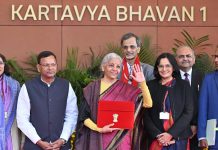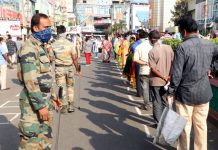VIJAY SINGH THAKUR | 62 YEARS

FORMER VICE-CHANCELLOR, DR Y S PARMAR UNIVERSITY OF HORTICULTURE AND FORESTRY
MASSIVE ENCROACHMENT of forest lands for planting apple orchards has remained the bug bear of successive governments in Himachal Pradesh. The majestic deodars have been felled mercilessly to clear the way for naked ambitions and greed. The problem remains, despite the Himachal Pradesh High Court orders directing the state authorities to take possession of the encroached areas. In a freewheeling interview with TEHELKA, Vijay Singh Thakur, former Vice-chancellor of Dr Y S Parmar University of Horticulture and Forestry, Nauni, winner Lifetime Achievement Award from Indian Academy of Horticulture Science, New Delhi, and himself a practicing horticulturist, talked to RAJ MACHHAN to get to the core of the issue as also share his thoughts on an array of new trends in the apple economy.
EDITED EXCERPTS FROM AN INTERVIEW •
Encroachment of forest land remains a critical issue for the government, apple growers, environmentalists, and the judiciary in the state. But little seems to have been done on the ground after the initial action, when apple trees on lands mostly occupied by small and marginal growers were cut down. What are your views on this?
Indeed it is a very serious issue. Presently, not much is being done on this front after the brief spell of action by the government at the behest of the HP High Court in 2018. In my view, it simply boils down to the political will of the government. In a small state like HP, where people don’t own much land, vote bank politics invariably come into play whenever this issue came to the fore. Successive governments have lacked the will to take aggressive action.
We hear of individuals who legally own land as little as five bighas, but grow apples in 100 bighas or more on the surrounding forest land encroached upon over the years. That is true. But I feel that such individuals are small in number. The majority of apple growers in the state had welcomed the initial High Court decision. Sadly, the big land grabbers have come to garner significant influence over policy makers in the government. On the judicial front, after numerous appeals, another bench of the High Court modified the original decision, directing the authorities to fence the encroached land instead of cutting the apple orchards planted on it. The mostly small growers, whose plants were cut down in the initial stages, are feeling let down.
Given the present state of affairs, do you feel it is a direct encouragement to others as well — people who have obeyed the law and stuck to their legally owned land — to cut down forest trees and start planting apples?
Yes this happens. Of late, some check has been there with authorities conducting a few random raids. But it is a fact, even in the present times, people who have any scope whatsoever to encroach upon forest land are still digging up small areas, extending their holdings meter by meter, to plant apple trees. They are not afraid. People are getting the feeling that the issue has died down.
Do you feel cutting down apple trees on encroached lands, giving way to the surrounding forest vegetation to reclaim the lost area, is a solution?
Not necessarily so. Apple trees too provide green cover. My personal opinion is that instead of cutting the trees, government should take effective control of the encroached land and earn revenue from the existing orchards.
Is the state Forest Department capable of it? Does it have the resources to enforce this kind of an arrangement?
The department has failed miserably. But it has been so all these years. Officials who were responsible for checking the encroachments to begin with, ignored these on one account or the other. They were clearly hand in glove with the encroachers; otherwise it would have been impossible for people to grab forest land. So much so, at places, people chose to dig up the forests to plant apple trees instead of growing orchards on their own land holdings. Now, the problem has assumed gargantuan proportions. It has gone out of control of the Forest Department. People have made huge money out of encroached lands over the years.
Where is all this leading up to?
To tell you very frankly, the big land grabbers have simply stopped caring. They have made their money, built up properties elsewhere, and even if cases are going on against them, they simply pay top money to lawyers and take advantage of the long-winded legal process. The small growers have suffered. Meanwhile, rogue elements are surreptitiously setting up compact sawmills in their backyards to process the deodars felled illicitly, using chainsaws, and selling the wood at commercial rates.

What do you feel is the way out?
The government needs to have the will to act. Authorities need to be strict in enforcing decisions. Elected representatives ought to rise above vote bank politics. The judiciary has to take charge. The High Court judge who had passed the initial judgment of cutting down orchards planted on encroached land is an example. He belonged to the apple growing areas and was seized of the magnitude of the problem.
Moving away from the issue, presently, we are increasingly seeing a new crop of self-proclaimed horticulture experts on social media. These individuals are getting good traction and some have turned this into a business opportunity. What do you have to say about this trend?
In a way it is a good development. People are interested in innovations, new varieties, and new ways of doing things. They are kind of practical scientists and claim to have learned from experience. Some of them have been trained by the horticulture university, but many of these youngsters do not have any formal education in horticulture. Others are attached to companies who pay them to evangelize their products or technologies. But I must say there is no universal answer to issues faced by apple growers in different areas. You must understand the local conditions and act accordingly. And yes, beware of false testimonials.
But don’t you feel this is a failure on the part of the Horticulture University, especially the extension activities of the university?
The university has been doing its bit, but the main thrust of scientists is on research work. It has been setting the standards and imparting training to the interested individuals as well. These people then go out and spread this knowledge to others. However, the institution faces its own challenges. They are understaffed and file work remains a priority. The mandate for the Krishi Vigyan Kendras is set by the Union government and apples are not always on priority.
Compared to the apple season in 2020, this year we are seeing an increased flow of skilled and unskilled migrant labor from Nepal. What is the reason?
Yes, this has been so. Last year we faced some shortage largely due to the Corona epidemic as also the ruling dispensation in Nepal. Nepalese workers are critical for the entire apple growing cycle, right from planting of trees to harvesting and post-harvest operations. They are physically suited for the job and earn higher daily wages compared to migrant labor from UP or Bihar employed for agriculture operations in Punjab and other states. Himachal remains a big revenue earner for the Nepalese. It’s a symbiotic relationship. This year they seem to be making up for the lost time.
The dreaded scab disease did not make an appearance this year.
It affected the crop in some areas last year. This year people were more vigilant. They took necessary precautions, mainly in terms of spraying the right fungicides, recommended by the Horticulture University.
What is the highlight of the apple season this year?
It’s a normal season, a good crop. In fact, its been a good year for all fruit crops including plums and pears. Apple production is expected to be above average. As per government predictions, around two crore apple boxes are expected to be produced in Shimla district. People in the plains can expect to buy the fruit at a reasonable price during the peak season.
LETTERS@TEHELKA.COM












